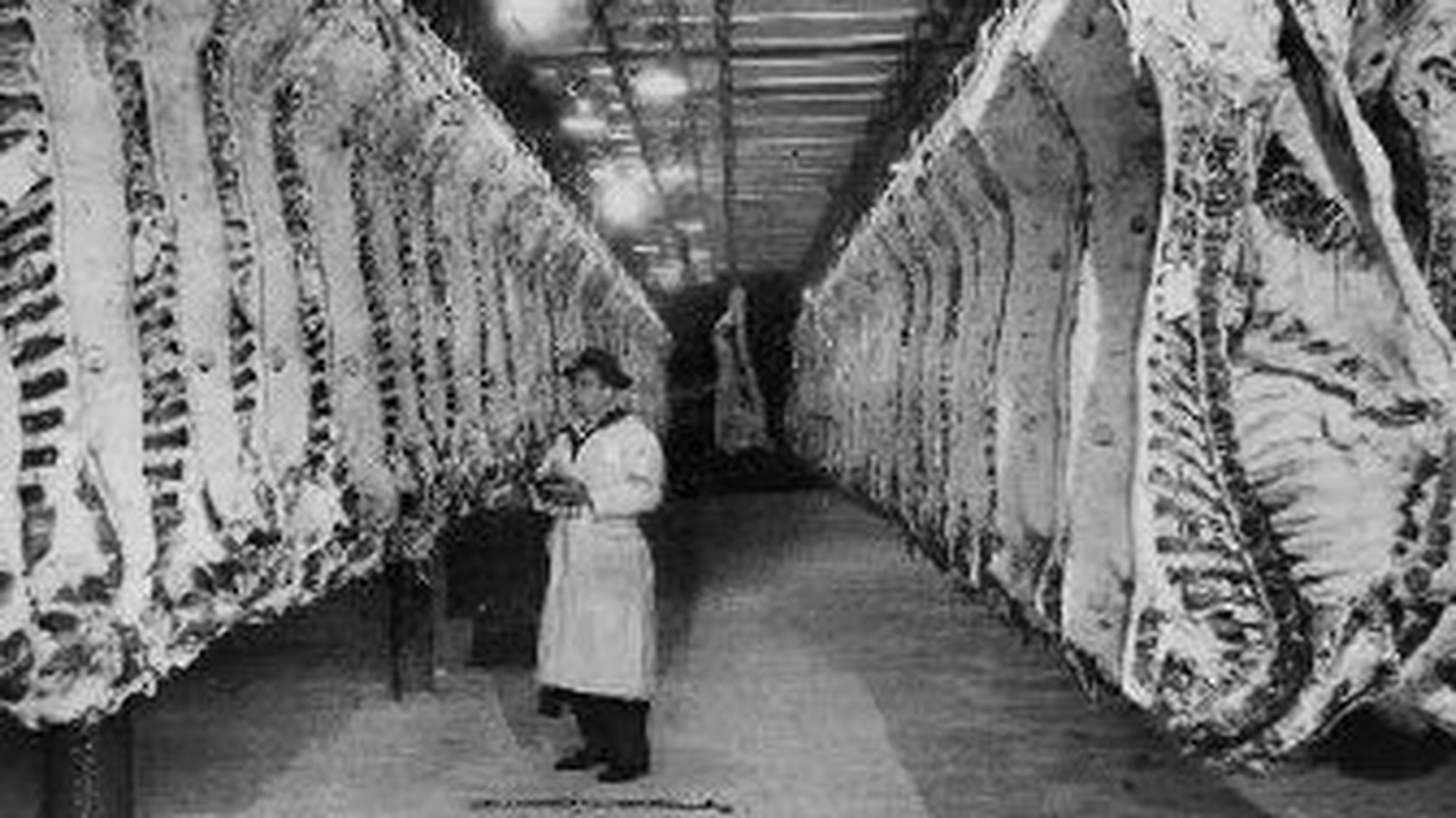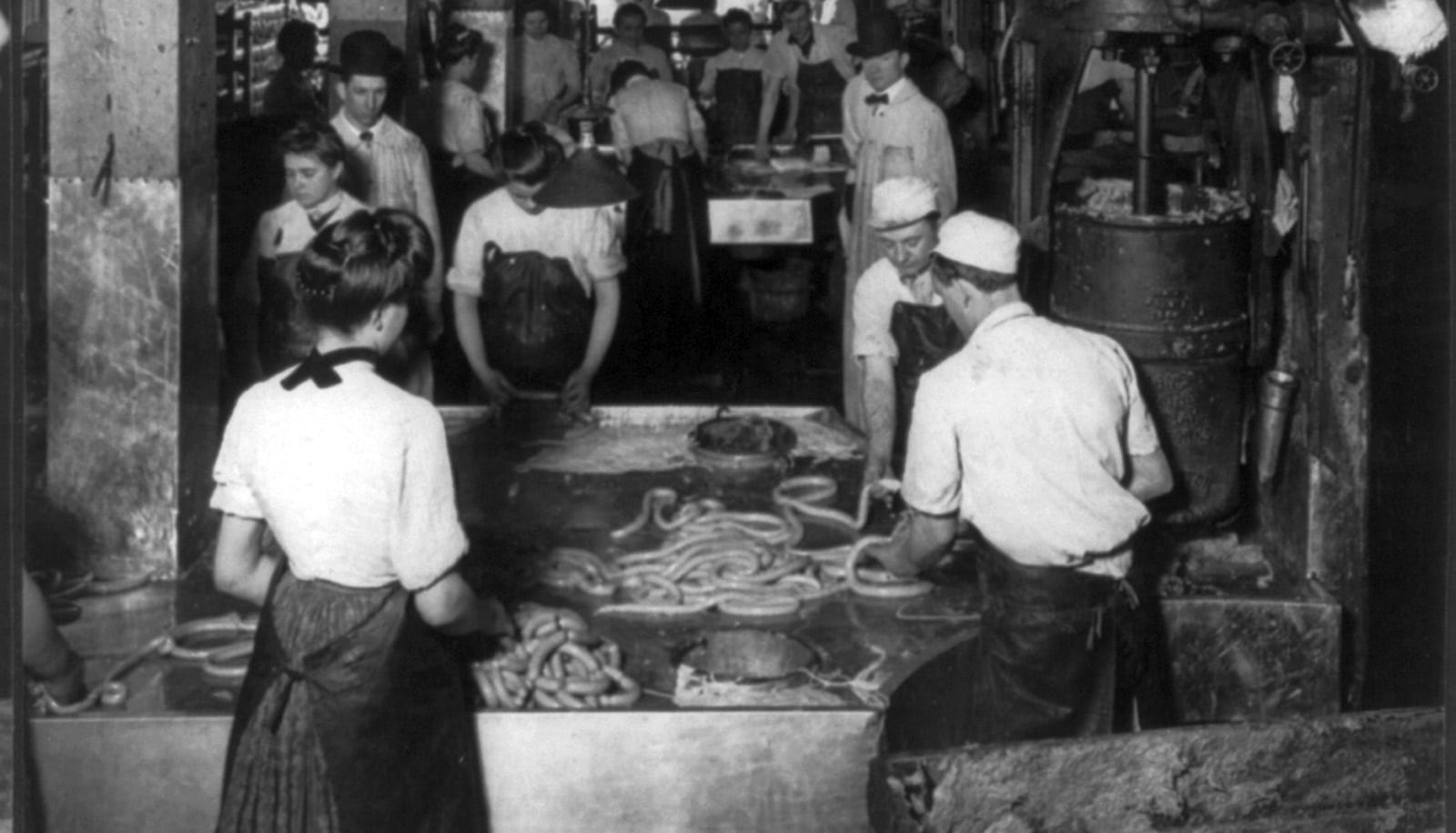The meatpacking industry is born. The Jungle was released to expose meatpacking industries ways of treating workers and meat.
Meat Packaging In Sinclair S Jungle Matt Galloway S Food In American History Blog
Meatpackers created an industrial assembly line requiring about 80 separate jobs from the slaughtering of an animal to processing the meat for sales BRIA 24 1 B Upton Sinclairs The Jungle.

. Thus many people became vegetarians until stricter laws were implemented. Muckraking the Meat-Packing Industry. His novel The Jungle 1906 a shocking exposé of the unsanitary and dangerous conditions in the plants was an immediate best-seller and incited.
In 1905 Upton Sinclair 18781968 a young socialist journalist and novelist received a 500 advance to write a novel about abuses in the meat processing industry and spent seven weeks investigating the subject in Chicago. Consumers were very concerned with the quality of meat they had been purchasing. The 1905 story about the Chicago meatpacking industry that inspired Upton Sinclairs novel The Jungle also shows the power of photojournalism a study argues.
Was a writer of novels of social protest and political tracts. There were the men in the pickle rooms for instance. For You For Only 1390page.
Meat Packing Immigrants and Rural Communities Abstract Over the past 45 years meatpacking has shifted from a predominantly urban to a predominantly rural industry. We Will Write a Custom Case Study Specifically. The Jungle details terrible working conditions in the meatpacking industry.
In the novel The Jungle by Upton Sinclair working conditions were horrible for immigrants who were employed in these factories. He is best known for his 1906 expose of the meatpacking industry The Jungle - Upton Sinclair wrote The Jungle to expose the appalling working conditions in the meat-packing industry and the poor treatment of immigrants. The Jungle is a 1906 novel by the American journalist and novelist Upton Sinclair.
English colonist and fur trader William Pynchon was the founder of Springfield Massachusetts. From the killing beds to the fertilizer plant the meatpacking plant is portrayed as a Hell on Earth a place of. In The Jungle Sinclair exposed the unsanitary conditions in the meat packing industry and this resulted in a greater public awareness of the problem and passage of laws regulating that.
Sinclairs book was so moving and troubling that it inspired the establishment of the Food and Drug Administration a federal agency that is to this day responsible for regulating. Up to 24 cash back Affect the Meat Packing Industry. The Jungle is as an exposé of the horrific working conditions and unsanitary conditions in Chicagos meatpacking industry.
Most readers were shocked by his exposure of health violations and unsanitary practices in the American meatpacking industry. Sinclairs primary purpose in describing the meat industry and its working conditions was to advance socialism in the United States. People in these factories were worked very hard and used up till they could not work anymore.
Meatpacking plants can represent a significant share. The Jungle The novel portrays the harsh conditions and exploited lives of American immigrants in Chicago and similar industrialized cities. This act required the Department of Agriculture to inspect every hog and steer whose carcass state lines.
Is it a Jungle Out There. In 1662 he became the New Worlds first meatpacker when he began packing large quantities of salted pork into barrels for export to the West Indies. The publication of The Jungle in 1906 sparked a drastic change in meat consumption.
With this release changes occurred. The meatpacking industry denied everything but investigators dispatched by then-President Theodore Roosevelt after he read The Jungle found that as the president relayed the Chicago stock yards are revolting Yet very little of The Jungle has to do with unsanitary meatpacking practices. The research looks back at a.
Luckily president Theodore Roosevelt was outraged and pushed. Sinclairs descriptions of rotten and contaminated food making it out the factory doors to consumers sparked outrage. The novel portrays the harsh conditions and exploited lives of immigrants in the United States in Chicago and similar industrialized cities.
Upton Sinclair wrote The Jungle to expose the appalling working conditions in the meat-packing industry. - Upton Beall Sinclair Jr. The Jungle a 1906 novel by Upton Sinclair is full of graphic descriptions of the poor conditions workers and cattle endured in the Chicago meat-packing industry.
President Roosevelt urged Congress to pass the Meat Inspection Act of 1906. Through a fictional plot Sinclair describes abysmally low wages and filthy and dangerous working conditions. The Jungle which he published in 1906 opened the eyes of the public to everything that they did not want to know about the American food industry.
Sinclairs grotesque descriptions of conditions and procedures in the meatpacking plant led to subsequent reforms in food safety regulation. The meat packing industrys working conditions were much worse in the 1900s than they are today. The Jungle a harrowing account of a Lithuanian immigrants experience laboring in Chicagos meatpacking industry was serialized.
His description of diseased rotten and contaminated meat shocked the public and led to new federal food safety laws. The following is an excerpt. Before the turn of the 20th century a major reform movement had emerged in the United States.

Shocking Chicago Meatpacking Pics Shifted Public Policy Futurity

A Century After The Jungle Meatpacking Still Has Some Problems The Spokesman Review

A Century After The Jungle Meatpacking Still Has Some Problems The Spokesman Review
0 Comments